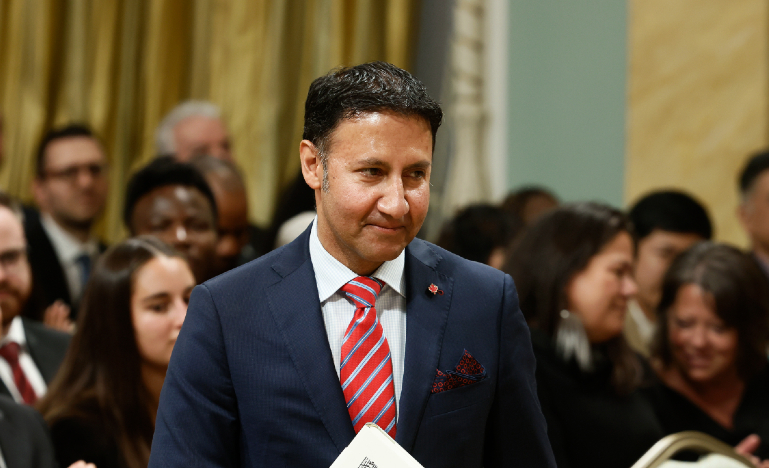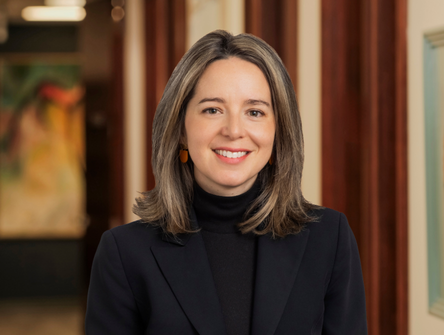Interview with Justice Minister Arif Virani
In a recent podcast, the Minister addressed resource challenges and court security in our justice system.

The following is an edited and condensed excerpt. To listen to the whole interview, including the Minister's comments on criminal justice reform, the recent pause on the expansion of MAiD and online harms legislation, click on the embedded link at the bottom of the article.
CBA National: There are mounting concerns about shrinking resources in the justice system across the country. Judges and all participants in the judicial system are being impacted by budgetary constraints, which affect the security of judges and access to justice. And at [the CBA’s Annual General Meeting], the Chief Justice of Canada himself referred to this. He expressed concern about access to justice, the impact of lack of resources and delays, and what that means for the public’s confidence in our justice system. To what extent is this issue on the agenda for discussion with your provincial counterparts?
Justice Minister Arif Virani: It’s always a concern given that we are in a situation with an expanding population, expanding court structures and pressing judicial needs. Security, unfortunately, of all personnel, whether that’s judicial or legal professionals or other professionals – that’s something we need to be very attentive to.
In terms of conversations with provincial and territorial counterparts, those are already taking place. We have these regular federal, provincial, and territorial meetings where we discuss the administration of justice in our respective jurisdictions, and addressing these needs is part of that, as well as the needs of the justice system more broadly.
Even coming out of the pandemic, there are still a lot of pressure points above concerns that we’re addressing — access to justice, judicial backlogs, the indigenous experience in our courts, for example. I’m also trying to do my utmost to address some acute judicial needs that relate to things such as the number of judicial appointments as expeditiously as possible. With David Lametti last year, we appointed 100 new individuals, which is a pretty favourable contrast to the average number of appointments per year under the previous government’s tenure, about 65 per year.
N: I understand that there have been a lot of appointments. But the vacancy rate always tends to hover around 8%. How come it’s difficult to get resources into the justice system?
AV: So you’re right; we started the year in January 2023 with about 85 vacancies. You would have thought we’d be at a plus 15, but we’re not. There are many vacancies, partly because of retirements, which are foreseeable, partly because people are electing to go supernumerary. Trying to understand and calibrate that situation is important. They are staffing and budgetary issues that relate to the provinces’ responsibility for the administration of justice. So, while I appoint members to superior courts, those courthouses are administered by the provinces, and that’s the way our constitutional architecture is set up. There’s a role for the Attorney General of Ontario and all of the other provinces to play in terms of ensuring their court systems are staffed and resourced appropriately, including the security needs, because one thing we’ve learned over the past three or four years is that there have been increasing levels of concern about security for people in the public eye and people who are doing high levels of public service. And I don’t want to dissuade people from attaining those offices. I want to encourage them, and making sure they’re protected and safe is part of that encouragement.
N: In Longueuil a couple of weeks ago, in the courthouse, there was a knife attack, and I think it was a court interpreter who suffered the brunt of that. So it’s not just about protecting the judges either; it’s also the court personnel.
AV: There’s no doubt, and that’s entirely unacceptable. My heart goes out to those court workers in Longueuil for what just transpired. But I know that these incidents occur, and we’ve got to make sure that we are being very diligent to keep our court staff, our court personnel, and our courts themselves safe.
But at the same time, what I’ve been seeing, particularly in Quebec, are efforts to make the courthouses more accessible, open, and welcoming to different kinds of litigants. I’m speaking about sexual violence courts where the hostility and adversarial nature and sometimes re-traumatization that victims of sexual violence sometimes feel in our run-of-the-mill courthouses. That’s being lessened and attenuated by a new model and a new way of thinking about how we address the court system.
While there are a lot of concerns, there are also a lot of innovations, and I’m here to try to address both, meet the concerns where they’re needed and power the innovation.
N: Minister of Justice, Arif Virani, thank you for joining us on Modern Law. We appreciate you taking the time to speak to our audience.
AV: It’s been a pleasure to be on. And can I put in a shameless pitch for all of the smart lawyers out there who may be considering a potential role on the bench? I can only appoint as many distinguished jurors as I have in the applicant pool. So please consider if you’re more than ten years of call and you feel like you have the ability and aptitude to serve as member of the bench, that is what we need. We need distinguished people serving and to continue that service as a lawyer in terms of a potential judicial applicant.
N: Do you think sometimes some of those potential candidates who don’t apply sell themselves short?
AV: I very much do. I think sometimes people don’t see themselves here. They think, “Well, I’m 10 or 11 years out. That’s for somebody who’s 20 years out.” And I always say to people that if you think even one of your colleagues has the chops to apply, have a quiet word with them. That can go a long, long way. And many of the people that I’ve had the fortune to appoint have said to me exactly that — that I would never have even gotten to this place were it not have been for a quiet word from that motion’s court judge, from that master, from the person who I appear before in this juror court, in court on appeal, in provincial court, as the case may be.
So that goes a long way. So, I mean it very seriously when I say I want people to consider the noble profession of being a jurist. It is very noble. It’s a distinguished role. But I also would like to increase the diversity on the bench and have the judges of this country reflect the litigants that are before them. And that’s something that I’m deeply committed to as well.
To listen to the rest of our interview, please listen on your preferred streaming service (Apple, Google, Spotify) or in the embedded audio below.
To contact us (please include in the subject line "Podcast"): national@cba.org


